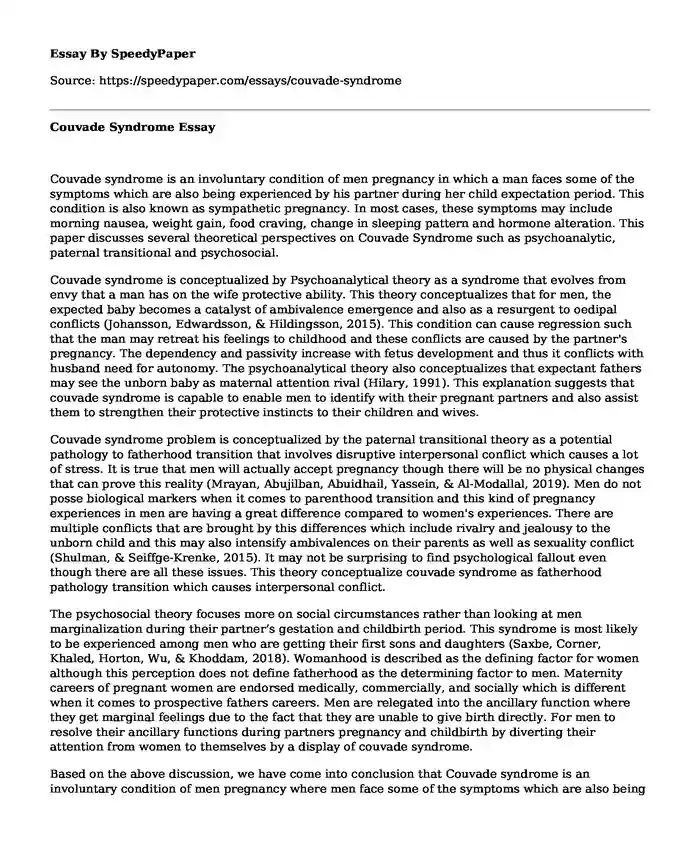Couvade syndrome is an involuntary condition of men pregnancy in which a man faces some of the symptoms which are also being experienced by his partner during her child expectation period. This condition is also known as sympathetic pregnancy. In most cases, these symptoms may include morning nausea, weight gain, food craving, change in sleeping pattern and hormone alteration. This paper discusses several theoretical perspectives on Couvade Syndrome such as psychoanalytic, paternal transitional and psychosocial.
Couvade syndrome is conceptualized by Psychoanalytical theory as a syndrome that evolves from envy that a man has on the wife protective ability. This theory conceptualizes that for men, the expected baby becomes a catalyst of ambivalence emergence and also as a resurgent to oedipal conflicts (Johansson, Edwardsson, & Hildingsson, 2015). This condition can cause regression such that the man may retreat his feelings to childhood and these conflicts are caused by the partner's pregnancy. The dependency and passivity increase with fetus development and thus it conflicts with husband need for autonomy. The psychoanalytical theory also conceptualizes that expectant fathers may see the unborn baby as maternal attention rival (Hilary, 1991). This explanation suggests that couvade syndrome is capable to enable men to identify with their pregnant partners and also assist them to strengthen their protective instincts to their children and wives.
Couvade syndrome problem is conceptualized by the paternal transitional theory as a potential pathology to fatherhood transition that involves disruptive interpersonal conflict which causes a lot of stress. It is true that men will actually accept pregnancy though there will be no physical changes that can prove this reality (Mrayan, Abujilban, Abuidhail, Yassein, & Al-Modallal, 2019). Men do not posse biological markers when it comes to parenthood transition and this kind of pregnancy experiences in men are having a great difference compared to women's experiences. There are multiple conflicts that are brought by this differences which include rivalry and jealousy to the unborn child and this may also intensify ambivalences on their parents as well as sexuality conflict (Shulman, & Seiffge-Krenke, 2015). It may not be surprising to find psychological fallout even though there are all these issues. This theory conceptualize couvade syndrome as fatherhood pathology transition which causes interpersonal conflict.
The psychosocial theory focuses more on social circumstances rather than looking at men marginalization during their partner's gestation and childbirth period. This syndrome is most likely to be experienced among men who are getting their first sons and daughters (Saxbe, Corner, Khaled, Horton, Wu, & Khoddam, 2018). Womanhood is described as the defining factor for women although this perception does not define fatherhood as the determining factor to men. Maternity careers of pregnant women are endorsed medically, commercially, and socially which is different when it comes to prospective fathers careers. Men are relegated into the ancillary function where they get marginal feelings due to the fact that they are unable to give birth directly. For men to resolve their ancillary functions during partners pregnancy and childbirth by diverting their attention from women to themselves by a display of couvade syndrome.
Based on the above discussion, we have come into conclusion that Couvade syndrome is an involuntary condition of men pregnancy where men face some of the symptoms which are also being experienced by their wives during child expectation period. We have seen that this condition is also known as sympathetic pregnancy. Symptoms may include food craving, morning nausea, weight gain, and hormone alteration. The paper has elaborated well on how theories such as psychoanalytic, paternal transitional, and psychosocial conceptualize the problem of couvade syndrome.
References
Johansson, J., Edwardsson, C., & Hildingsson, I. (2015). The "Pregnant Man"-Expecting Fathers Experience Pregnancy-Related Changes: A Longitudinal Study With a Mixed Method Approach. Journal of Men's Health, 11(6).
Klein, Hilary (1991). "Couvade syndrome: Male counterpart to pregnancy". International Journal of Psychiatry in Medicine. 21 (1): 57-69. doi:10.2190/FLE0-92JM-C4CN-J83T
Mrayan, L., Abujilban, S., Abuidhail, J., Bani Yassein, M., & Al-Modallal, H. (2019). Couvade Syndrome Among Jordanian Expectant Fathers. American journal of men's health, 13(1), 1557988318810243.
Saxbe, D., Corner, G. W., Khaled, M., Horton, K., Wu, B., & Khoddam, H. L. (2018). The weight of fatherhood: identifying mechanisms to explain the paternal perinatal weight gain. Health psychology review, 12(3), 294-311.
Shulman, S., & Seiffge-Krenke, I. (2015). Fathers and adolescents: Developmental and clinical perspectives. Routledge.
Cite this page
Couvade Syndrome. (2022, Dec 23). Retrieved from https://speedypaper.com/essays/couvade-syndrome
Request Removal
If you are the original author of this essay and no longer wish to have it published on the SpeedyPaper website, please click below to request its removal:
- HR Essay Sample: Post-Training Evaluation Plan
- Learning Through Play - Child Development Essay Example
- Free Essay with the Definition of Sexism and Sexist Language
- Free Essay: Statistical Analysis on Meteorological Dataset
- Free Essay on How Determinate Sentencing Fails to Accomplish Equality of Punishment
- Free Essay: How to Succeed in College and Life
- Essay Sample on Observation Protocols
Popular categories





